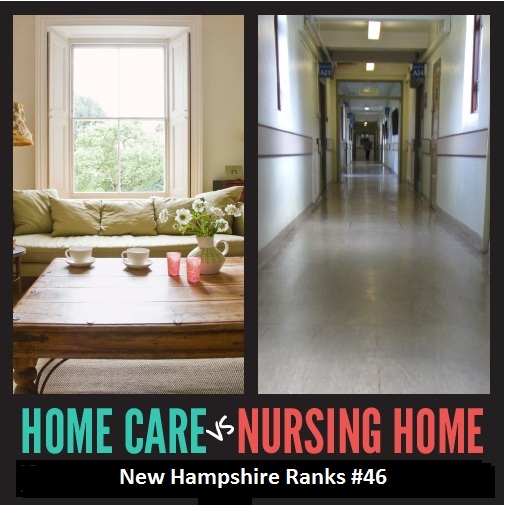AARP Hearing Center

New Hampshire ranks #46 when it comes to offering services that help keep people in their homes and communities as they age. AARP warns more must be done to change our long-term care system in order to give people the care they want and need, in the setting of their choice, at a lesser price. Nearly all – 94% -- of New Hampshire residents say they want to age at home, and not a nursing home.
Raising Expectations 2014: A State Scorecard on Long-Term Services and Supports for Older Adults, People with Physical Disabilities, and Family Caregivers ranks each state overall and within 26 performance indicators along five key dimensions: affordability and access; choice of setting and provider; quality of life and quality of care; support for family caregivers; and, effective transitions. New indicators this year include length of stay in nursing homes and use of anti-psychotic drugs by nursing homes, raising serious concerns about the quality of institutional care. This new AARP Scorecard was designed with the support of the nation’s leading organizations behind quality long-term care: The Commonwealth Fund and SCAN Foundation.
“The vast majority of older Granite Staters want to live independently, at home, as they age – most with the help of unpaid family caregivers,” says AARP New Hampshire State Director Todd Fahey. “Even facing tight budgets following the Great Recession, most states made clear progress to help older residents achieve that goal. It’s time for New Hampshire to step up to the plate, and this Scorecard shows what we have to do.” AARP serves nearly 228,000 residents age 50 and older in New Hampshire.
The single strongest predictor of a state’s long-term care system is the reach of its Medicaid long-term care safety net. That’s why AARP has been fighting to expand services provided at home and in the community, by shifting funds away from less desirable and more expensive nursing home care. Unfortunately, New Hampshire ranks #46 in the percentage of Medicaid long-term care dollars that support care provided at home and in the community – the care setting most residents prefer.
“We need to look at the costs of home care vs. nursing home care,” continued Fahey. “Nursing home care is three times more expensive than home care. But we still spend eight out of 10 taxpayer dollars on this more expensive, less desirable nursing home care. This is an alarming statistic and totally unsustainable as New Hampshire ages and our state is aging rapidly!” continued Fahey.
The Scorecard also ranks New Hampshire #50 in its support of family caregivers, who are the backbone of our long-term care system. A 2010 AARP New Hampshire survey found that nearly one out of every three adults (31%) has provided unpaid care to an adult relative or friend during the previous year; this figure is much higher than the national average of 21%.
“In New Hampshire, approximately 183,000 family caregivers provide unpaid care with an annual value of $2.2 billion. This silent army of family caregivers saves the state money by keeping their loved ones out of costly nursing homes – most often paid for by Medicaid tax dollars. They have earned some basic support and that is why AARP New Hampshire will continue to fight for family caregivers through a variety of means,” continued Fahey. Discussions are ongoing with key stakeholders, elected leaders and government officials to address these challenges.
Not all is gloom and doom. New Hampshire ranks at the top in its Aging and Disability Resource Centers, more commonly known as ServiceLink. These local centers provide support to Granite Staters, their caregivers and their families in navigating the complex long-term care system. Over the years, AARP has been instrumental in supporting the funding for these vital resources. “This shows that with planning, will and implementation, New Hampshire can be a leader,” concluded Fahey. “But we need to do more and we need to do it soon!”
Long-term care (also called long-term services and supports) is a diverse set of services designed to help older people and those with disabilities. Services can be provided in a person’s home, in a community setting such as an adult day center, or in a group residential facility like a nursing home.
The full state Scorecard, along with an interactive map of state rankings and information, is available at www.longtermscorecard.org.































































